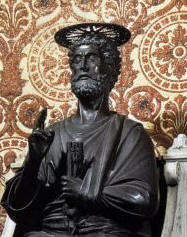Council of Sardica (Serdica ― Modern Sophia, Bulgaria): Canon 5, 343 A.D.

Thirteenth-Century Bronze Statue of Saint Peter
St. Peter's Basilica, Rome
|
Council of Sardica (Serdica ― Modern Sophia, Bulgaria): Canon 5, 343 A.D. |
Thirteenth-Century Bronze Statue of Saint Peter St. Peter's Basilica, Rome |
Sardica was the first synod which asserted, in some sense, Roman primacy in the Church
(Greek Version)
BISHOP HOSIUS said: Decreed, that if any bishop is accused, and the bishops of the same region assemble and depose him from his office, and he appealing, so to speak, takes refuge with the most blessed bishop of the Roman church, and he be willing to give him a hearing, and think it right to renew the examination of his case, let him be pleased to write to those fellow-bishops who are nearest the province that they may examine the particulars with care and accuracy and give their votes on the matter in accordance with the word of truth. And if any one require that his case be heard yet again, and at his request it seem good to move the bishop of Rome to send presbyters a latere, let it be in the power of that bishop, according as he judges it to be good and decides it to be right--that some be sent to be judges with the bishops and invested with his authority by whom they were sent. And be this also ordained. But if he think that the bishops are sufficient for the examination and decision of the matter let him do what shall seem good in his most prudent judgment.
The bishops answered: What has been said is approved.
(Latin Version)
BISHOP HOSIUS said: Further decreed, that if a bishop is accused, and the bishops of that region assemble and depose him from his office, if he who has been deposed shall appeal and take refuge with the bishop of the Roman church and wishes to be given a hearing, if he think it right that the trial or examination of his case be renewed, let him be pleased to write to those bishops who are in an adjacent and neighboring province, that they may diligently inquire into all the particulars and decide according to the word of truth. But if he who asks to have his case reheard, shall by his entreaty move the Bishop of Rome to send a presbyter a latere it shall be in the power of that bishop to do what he shall resolve and determine upon; and if he shall decide that some be sent, who shall be present and be judges with the bishops invested with his authority by whom they were appointed, it shall be as he shall choose. But if he believe that the bishops suffice to give a final decision, he shall do what he shall determine upon in his most wise judgment.
selected from Henry R. Percival, ed.,The Seven Ecumenical Councils of the Undivided Church, Vol XIV of Nicene and Post Nicene Fathers, 2nd series, edd. Philip Schaff and Henry Wace, (repr. Edinburgh: T&T Clark; Grand Rapids MI: Wm. B. Eerdmans, 1988) p. 419
This text is part of the Internet Medieval Source Book. The Sourcebook is a collection of public domain and copy-permitted texts related to medieval and Byzantine history.
Unless otherwise indicated the specific electronic form of the document is copyright. Permission is granted for electronic copying, distribution in print form for educational purposes and personal use. If you do reduplicate the document, indicate the source. No permission is granted for commercial use.
(c)Paul Halsall Jan 1996
halsall@murray.fordham.edu